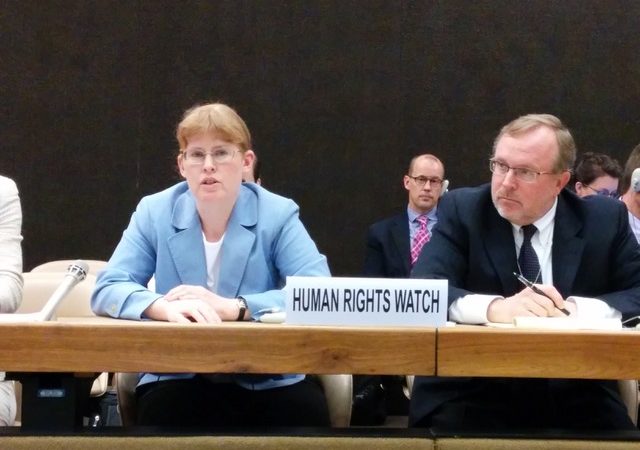In the thick of it with Bonnie Docherty ’90

Bonnie Docherty ’90 has a long-held passion for the study of history. Her interests were nurtured in Waynflete’s Upper School by teachers like Karen Whitney and Alice Brock, and she planned to eventually pursue a doctoral degree. But after majoring in history and literature at Harvard, and a three-year stint as a journalist, Bonnie’s inquisitive nature began to pull her in a different direction. She wanted to be “present at the creation”—not removed from historical events, but on the ground when history was being made.
Bonnie returned to Harvard in 1998 to study law. Her earlier educational experiences had often focused on armed conflict, so she was pulled towards issues of international humanitarian law—“the law of war”—particularly as it applied to the treatment of civilians during armed conflict. She won a fellowship at Human Rights Watch, with a planned start date of September 12, 2001. Six months later, in the aftermath of 9/11, Bonnie was in Afghanistan investigating the United States’s use of cluster munitions.

Conducting interviews in Iraq
Cluster munitions indiscriminately disperse hundreds of smaller submunitions, or “bomblets,” over areas the size of football fields. They cause significant harm to civilians in populated areas due to their wide-area effect and their high failure rate. A significant proportion of bomblets fail to explode on impact, instead lingering like landmines and endangering civilians for years to come. Children are at particular risk because they often mistake these small munitions for toys.
Although her work is harrowing, Bonnie is motivated by her interactions with civilians who have been affected by war. “It goes back to my roots in journalism,” she explains. “I want to be out in the field because I need to see things for myself. I want to talk to people who have witnessed and experienced the effects of armed conflict.”

In Iraq with Army Tactical Missile System
Inspired by the success of the 1997 Landmine Ban Treaty, Bonnie became part of a team whose work culminated in a global ban on the use of cluster munitions. “After working in Afghanistan, I never imagined that there could be regulations around the use of these weapons,” Bonnie says. “But by 2008, we had an international treaty that made their use illegal.” While Libya and Syria—“nations with notorious disregard for international law”—continued to use cluster munitions, they have not been used since by any of the 119 countries party to the treaty. The treaty has also influenced nations that are not party to the agreement, including the United States, which has launched only one cluster munition since the treaty was signed. “The stigma that the Convention on Cluster Munitions created makes a big difference,” says Bonnie.
ICAN and Harvard’s International Human Rights Clinic
In 2005, Bonnie transitioned to a part-time role at Human Rights Watch and returned to Harvard Law School to become the Associate Director of Armed Conflict and Civilian Protection and a lecturer at the school’s International Human Rights Clinic. Her field work continued, but treaty negotiation work now consumed much of her time. Bonnie’s combined background in history, literature, and the law is valuable here, enabling her to parse language and craft arguments that affect how countries act.

At autonomous weapons conference
In 2016, Bonnie turned her attention to the testing, stockpiling, and use of nuclear weapons. Organizations like the International Committee of the Red Cross and the International Campaign to Abolish Nuclear Weapons (ICAN) had earlier begun to employ a unique strategy to reframe the issue. “They took the approach that nuclear weapons are a humanitarian problem, not a national security problem,” says Bonnie. “The issue transcends national interests.” The strategy began to gain traction among UN member states.
Bonnie recognized the rare opportunity to support ICAN and provide students in Harvard’s International Human Rights Clinic with hands-on experience. Partnering with ICAN and the UK group Article 36, Bonnie’s team produced several papers and provided legal assistance during UN treaty negotiations. The Harvard team made their own contribution to the treaty, successfully arguing for the inclusion of language obligating countries to assist victims and remediate the environment affected by nuclear weapon detonations. “We did a lot of advocacy work to get these provisions in the treaty,” says Bonnie. “It was very exciting for all of us.”
The UN General Assembly took up the issue in 2016. After only four weeks of negotiations, the Treaty on the Prohibition of Nuclear Weapons was adopted in July 2017.
Nobel Prize
In October 2017, the Norwegian Nobel Committee awarded the 2017 Nobel Peace Prize to ICAN “for its work to draw attention to the catastrophic humanitarian consequences of any use of nuclear weapons and for its groundbreaking efforts to achieve a treaty-based prohibition of such weapons.” The award ceremony took place on December 10 and featured speeches by Hiroshima survivor Setsuko Thurlow and ICAN Executive Director Beatrice Fihn. Four days of celebration in Oslo also included a torch-light parade, a concert, and a museum exhibition opening. “It was amazing to be part of this coalition,” says Bonnie. “These individuals are not heads of state or leading politicians. They’re just a group of ordinary people doing extraordinary things. It was an inspiring experience.”
. . .
Learn more:
Listen to a recording of ICAN Executive Director Beatrice Fihn receiving “the call from Oslo.”




